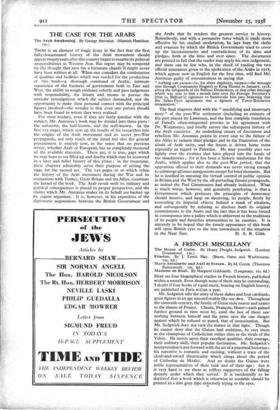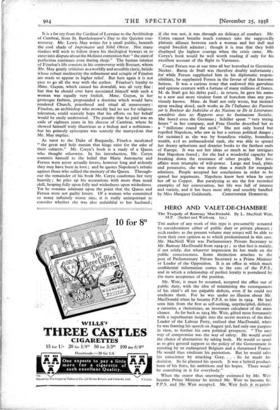A FRENCH MISCELLANY
Finelon. By J. Lewis- May. (Burns, Oates and Washbourne. los. 6d.)
Marie Antoinette and Axel de Fersen. By M. Coryn. (Thornton Butterworth. xos. 6d.)
Madame de Stahl.. By Margaret Goldsmith. (Longman. los. 6d.) HERE are four biographical studies in French history, published within a month. Even though none of them may be outstanding, I doubt if four books of equal merit, bearing on English history, are published in Paris within a year.
Mr. Sedgwick tells the story of three dukes and four cardinals, great figures in an age uncomfortably like our dwn. Throughout
the sixteenth century, the family of Guise stole nearer and nearer to the throne of France. Claude, Francois, Henri—each gained further ground as time went by, until the last of them saw nothing between himself and his prize save the one danger against which he refused to guard, that-of assassination. But Mr. Sedgwick does not view the matter in that light. Though he cannot deny that the Guises had ambition, he sees them as the champions of Catholicism rather than as the rivals of the Valois. He insists upon their excellent qualities, their courage, their military skill, their popular fascination. Mr. Sedgwick's interpretation is put forward with the art of a practised historian ; his narrative is romantic and exciting, without a trace of the
cloak-and-sword theatricality which clings about the period of Catherine de Medici. And no doubt the Guises were noble representatiVes of their rank and of their age : but it is very bard to see them as selfless supporters-of the falling dynasty under which they served: It is -incidentally- to be deplored that a book which is otherwise so readable should be
printed in a dim grey.type extremely trying to the eyes.
It is a far cry from the Cardinal of Lorraine to the Archbishop of Cambrai, from St. Bartholomew's Day to the Quietist con- troversy. Mr. Lewis May writes for a small public, beneath the cool shade of Imprimatur and Nihil Obstat. .Not, many ieaders will wish to follow down his theOhigical byways or to enter into dispute about the Molinist contention that " the state of perfection continues even during sledp-." The human interest of Fenelon's life consists in his controversy with Bossuet, whom 1.1,4r. May gently criticises as a worldly and unsubtle cleric, besidevti hose robust mediocrity the refinement and scruple of Fenelon are made to appear in higher relief. But here again it is not easy to go all the way with the author. Fenelon's loyalti to Mine. Guyon, which caused his downfall, was all very. fine : but that he should ever have associated .himself such a woman was equally very foolish. Mine: Guyon, in her grotesque fashion, propounded a doctrine which would have rendered Church, priesthood and ritual all unnecessary : Fenelon, an archbishop who avowedly had no use for religious toleration, could scarcely hope that his efforts on her behalf would be easily understood. The penalty that he paid was an exile of eighteen years in his diocese of Cambrai, where he showed himself truly illustrious as a bishop and a nobleman : but his princely episcopate was scarcely the martyrdom that Mr. May implies.
As tutor to the Duke of Burgundy, Fenelcn inculcated " the great and holy maxim that kings exist for the sake of their subjects." Mr. Coryn's book is a study of a Queen who thought, otherwise. In his introduction, Mr. Coryn commits himself to the belief that Marie Antoinette and Fersen were never actually lovers, however long and ardently they may have been in love ; and he quotes Napoleon's rebuke against those who sullied the memory of the Queen. Through- out' the remainder of his book Mr. Coryn condemns her very heartily ; he piles up his accusations with more than usual skill, heaping folly upon folly and wickedness upon wickedness. Yet he remains adamant upon the point that the Queen and Fersen were not guilty lovers. Of a woman who committed so many infinitely worse sins, it is really unimportant to consider whether she was also unfaithful to her husband ; if_she was not, jt was through no cielieagy.of -cspmittct. Mr. Coryn cannot breathe much romance into the supposedly platonic alliance between such a woman and her dull and stupid Swedish admirer ; though it is true that they both displayed the highest courage when the crisis came. Mr. Coryn's book would be well worth reading if only for his excellent account of the flight to Varennes.
Count Fersen was at one time all but betrothed to Germaine Necker. Baron de Steel was therefore doubly unfortunate ; for while Fersen supplanted him in his diplomatic respon- sibilities, he supplanted Fersen in the favour of that fearsome heiress. It was a curious irony that endowed this garrulous and epicene creature with a fortune of many millions of francs. M. de Steel got his debts paid ; in return, he gave his name to a new and more virulent form of boredom than any pre- viously known. Mme. de Steel not only wrote, but insisted upon reading aloud, such works. as De l'Influence des Passions sur le Bon%eur des Individus et des Nations or De la Litterature considiree dans ses Rapports avec les Institutions Sociales. She bored even the Germans ; Schiller spent " very trying hours " in her company, and Frau Goethe described her as a " millstone round the neck." She not only bored but repelled Napoleon, who saw in her a serious political danger ; for sustained as she was by boundless vitality, boundless wealth, and an ambassadorial rank, she was able to spread her dreary aphorisms and drearier books to the farthest ends of Europe. It was not her ideas so much as her intrigues that Napoleon feared ; for she had a wonderful capacity for breaking down the resistance of other people. Her love affairs were triumphs of will-power. Large and loud, plain and possessive, she was more than a match for renegade admirers. People accepted her conclusions in order to be spared her arguments. Napoleon knew best when he sent her off to Coppet. But paralysing as are the few recorded examples 'of her conversation, her life was full of interest and variety, and it has been most ably and sensibly handled















































 Previous page
Previous page